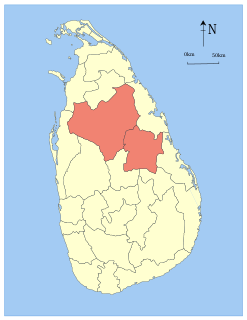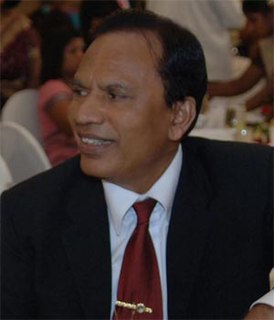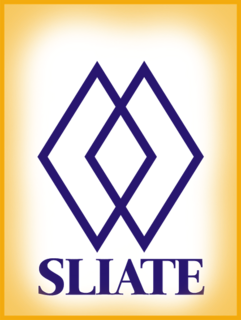
The University of Moratuwa is a public university in Sri Lanka. It is located on the bank of the Bolgoda Lake in Katubedda, Moratuwa. Apart from academics including undergraduate and postgraduate studies, the University of Moratuwa presents social and cultural activities, student services, societies, and sports and recreational activities. The institution was known as Ceylon College of Technology, Katubedda before gaining university status. Its roots go back to the Institute of Practical Technology founded in 1960 to provide technical education.

North Central Province is one of the nine provinces of Sri Lanka, the first level administrative division of the country. The provinces have existed since the 19th century but did not have any legal status until 1987 when the 13th Amendment to the Constitution of Sri Lanka established provincial councils. The province is the largest by size, and second least populated in the country. The province consists of the districts of Anuradhapura and Polonnaruwa, both of which were important ancient Sri Lankan kingdoms. The climate is semi-arid, and the forests are dry evergreen forests.
The Government Clerical Service Union (GCSU) is a trade union of clerical workers who work in the public sector in Sri Lanka. This was formed in the 1920s when Sri Lanka (Ceylon) was under British colonial rule. It is a politically independent trade union but the majority of the activists were Communists early in its history.

The Colombo Municipal Council is the municipal governing body of Colombo, the largest city and financial centre in Sri Lanka. It consists of a directly elected executive Mayor of Colombo, current elect is Rosy Senanayake, and 119 elected 119 municipal councilors. The council was formed in 1865, it first met in 1866 and derives most of its powers from Municipal Council Ordinance No. 29 of 1947.

In Sri Lanka, districts are the second-level administrative divisions, and are included in a province. There are 25 districts organized into 9 provinces. Each district is administered under a district secretary, who is appointed by the central government. The main tasks of the district secretariat involve coordinating communications and activities of the central government and divisional secretariats. The district secretariat is also responsible for implementing and monitoring development projects at the district level and assisting lower-level subdivisions in their activities, as well as revenue collection and coordination of elections in the district. A district is divided into a number of Divisional Secretary's Divisions, which are in turn subdivided into 14,022 grama niladhari divisions. There are 331 DS divisions in the country.

The Sri Lanka Air Force (SLAF) is the air arm and the youngest of the Sri Lanka Armed Forces. It was founded in 1951 as the Royal Ceylon Air Force (RCyAF) with the assistance of the Royal Air Force (RAF). The SLAF played a major role throughout the Sri Lankan Civil War. The SLAF operates more than 160 aircraft and has a projected trained strength of 27,400 airmen and 1,300 officers, who are from both regular and reserve service. The Sri Lanka Air Force has expanded to specialise mainly in providing air-support to ground forces, troop landing, and carrying out airstrikes on rebel-held areas in the Northern and Eastern theatres, but is also capable of high- and low-level air defence.
The Indian Post & Telecommunication Accounts and Finance Service ( IP&TAFS) is a Group "A" Central Civil Services of the Union of India. The Service was started in the year 1972 for prudent and professional management of the finances of the Department of Posts and Department of Telecommunications which were the sole provider of the communications needs of the country at that time. Gradually, over time the service has crystallized into a professional cadre of over 376 officers. In 2017, 25 officers were recruited through prestigious Civil Services Examination conducted by Union Public Service Commission.
The Ceylon Civil Service, popularly known by its acronym CCS, was the premier civil service of the Government of Ceylon under British colonial rule and in the immediate post-independence period. Established in 1833, it functioned as part of the executive administration of the country to various degrees until Ceylon gained self-rule in 1948. Until it was abolished on 1 May 1963 it functioned as the permanent bureaucracy or secretariat of Crown employees that assisted the Government of Ceylon.
The Sri Lanka Administrative Service (SLAS) is the key administrative service of the Government of Sri Lanka, with civil servants working for both in the Central Government as well as in the provincial councils. It was formed as the Ceylon Administrative Service (CAS) in 1963 as the successor to the Ceylon Civil Service which was abolished on May 1, 1963. It is the senior of the public services.

Mapatunage James "M. J." Perera was a Sri Lankan civil servant with nine members in his family in Udumulla, Padukka. He created broadcasting history by being the first Ceylonese Director General of Radio Ceylon, the oldest radio station in South Asia, taking over the helm from John Lampson of the BBC.

India-Sri Lanka relations also referred to Indian-Sri Lankan relations or Indo-Sri Lanka relations, are the bilateral relations between India and Sri Lanka. Only 4% of Sri Lankans have a negative view on India, the lowest of all the countries surveyed by the Ipsos GlobalScan. The two countries are also close on economic terms with India being the island's largest trading partner and an agreement to establish a proto single market also under discussion at an advanced stage. There are deep racial and cultural links between the two countries. India and Sri Lanka share a maritime border. India is the only neighbour of Sri Lanka, separated by the Palk Strait; both nations occupy a strategic position in South Asia and have sought to build a common security umbrella in the Indian Ocean. Both India and Sri Lanka are republics within the Commonwealth of Nations.

Sanath Rathnayake Weerakoon, is a Sri Lankan former government agent. He served as the government agent for the District of Colombo (1990–1999), Sri Lanka, and is considered one of the most distinguished and respected officers in the Sri Lankan Administrative Service. He served as the government agent of Colombo for 10 years under two different governments and is a feat that has not yet been broken. Weerakoon was also the youngest appointed government agent, to the District of Puttalam in 1978. The government agent is the administrative had of public services in the district. The post is one of the oldest in the civil service as it had been established by the British during the colonial era. Weerakoon is the current add. private secretary to the president of Sri Lanka.
The Sri Lanka Overseas Service (SLOS) which is most commonly referred to as the Sri Lanka Foreign Service is the foreign service of Sri Lanka. It is the body of career diplomats of Sri Lanka. The Permanent Secretary of the Ministry of Foreign Affairs is also the head of the foreign service.

The Sri Lanka Institute of Development Administration is a research and training institute focusing on public policy and public administration in Sri Lanka. It is operated as a government-operated company through the Ministry of Public Administration and Management and is located in Colombo.
Sri Lanka is divided into 9 provinces, which are further subdivided into 25 districts. Districts are further subdivided into Divisional Secretary's Divisions. Each DS Division is divided into Grama Niladhari Divisions.
Mohamed Shibly Aziz, PC was a Sri Lankan lawyer. He served as Attorney General of Sri Lanka from 1995 to 1996 and served in the Constitution Council of Sri Lanka from 2015 to 2018.
The Sri Lankan Malaysians are an ethnic group that consists of people of full or partial Sri Lankan descent who were born in or immigrated to Malaysia.

The Sri Lanka Institute of Advanced Technological Education is a statutory body in Sri Lanka coming under the purview of the Higher Education Ministry and offering Higher National Diploma courses. At present, it manages and supervises eighteen provincial Advanced Technological Institutes throughout the island. The Institute is traditionally known for its education in the accountancy and engineering. As per the recommendations of the Committee appointed by Prof. Wiswa Waranapala, Deputy Minister of Higher Education in 1994, the Sri Lanka Institute of Advanced Technical Education (SLIATE) was formed in 1995, under the Sri Lanka Institute of Advanced Technical Education Act No. 29 of 1995. In 2001 the name of the institution was amended as Sri Lanka Institute of Advanced Technological Education (SLIATE).
Information Technology in Sri Lanka refers to business process outsourcing, knowledge process outsourcing, software development, IT Services, and IT education in Sri Lanka. Sri Lanka is always ranked among the top 50 outsourcing destinations by AT Kearney, and Colombo and ranked among "Top 20 Emerging Cities" by Global Services Magazine. The export revenue of this industry grew from USD 213 million in 2007 to USD 1089 million in 2019.









